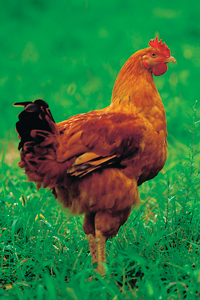 For a variety of reasons, pseudo-farms are springing up in the most urban settings. We want to feed our families wholesome, nutritious foods, to have some control over how and where our food is grown or raised, and to experience agriculture first-hand.
For a variety of reasons, pseudo-farms are springing up in the most urban settings. We want to feed our families wholesome, nutritious foods, to have some control over how and where our food is grown or raised, and to experience agriculture first-hand.
Chickens are the primary animals seen on urban farms. People are drawn to the idea of fresh, natural eggs. As a bonus, chickens also eat some pests in your garden, and their waste is good fertilizer for your compost. What might surprise you is that chickens are friendly, entertaining, and full of personality. But that doesn’t mean they’re welcome in every neighborhood, as cities and counties vary in the ordinances that regulate chicken farming. Some homeowners’ associations may have more restrictions in place. The city of Richmond, for example, allows up to four hens per household, but a permit must be obtained first. Surrounding counties do not require a permit, but do prohibit birds “running at large,” require setbacks of twenty-five feet or more (the distance the chickens must be kept from a dwelling), and maintain noise ordinances that will make any rooster unwelcome. (Be sure to check online for your city or county’s laws regarding raising chickens.)
Nothing against the boys, but you don’t need a rooster to get fresh eggs. Hens will lay without a male in sight. Chickens are quite gregarious, meaning they do best with company, living in flocks. A reasonable backyard flock consists of two to six hens.
There are many varieties of chickens, selected and bred for specific traits such as egg-laying, meat production, disposition, and even appearance. A local farm-supply store or a search on the Internet will provide resources for choosing what type of hen is best for you and your family.
Hens require a coop – an enclosure where they can roost and lay eggs. This protects them from predators and the elements and confines them, making your neighbors happy as well. The coop is basically walls and a roof, so the design is only limited by your imagination and budget. Chickens have a natural instinct to roost in the evening, so training them to their coop is easy. A bar or dowel mounted off the ground is all they need to roost, and a simple box lined with straw is all they need to lay eggs. Preassembled coops and coop kits are available for you to buy, or you can build a coop with materials available from home improvement stores.
Access to the outdoors is needed to express innate behaviors such as foraging for food, taking dirt baths, interacting with flock mates, or just relaxing in the sun and shade. Fencing is mandatory in an urban setting to keep hens from wandering onto nearby properties and roads. You might consider a fenced coop-top as well to protect your chickens. They don’t fare well when it comes to predators: raccoons, foxes, hawks, and the most common source of attack – our own pet dogs. You can always just let chickens out in the backyard, but beware of the hazards and always secure them in their predator-proof coop at night.
Feeding your chickens is simple, but there are certain diets for their various life stages (feed for these diets is commercially available). Layer diets, referring to chickens’ function of laying eggs, are for juvenile to adult birds. All feeds – both chick and layer diets – come as ready-to-eat pellets or crumble. Your local farm-supply store is the best provider for feed. You can also supplement their diet with treats such as grains or fruits and vegetable scraps. Chickens need clean drinking water at all times, offered in any type bowl.
In addition to the daily duties of feeding and collecting eggs, plan on a bit of weekly maintenance. This includes cleaning and replacing straw in the laying boxes. Old straw and manure should be removed regularly and can be composted. Also, be sure to check for damage to the fence and coop in case predators are getting curious.
Although chickens are generally docile, they can have sharp nails and they peck out of curiosity with their beaks. While handling a chicken, support its body comfortably, keep the beak pointed away from you, and control the feet. After handling your chickens, always wash your hands before doing anything else, especially preparing or eating food.
In order to collect safe, edible eggs, you need clean chickens. Keep the yard, coop, and nest boxes free of manure buildup. Provide roosting options away from nesting boxes, so hens are encouraged to roost in one area and lay in another. Collect eggs with clean hands, frequently throughout the day, if possible. Allow the eggs to dry and remove any debris with a dry cloth. If the egg is obviously contaminated with a bit of fecal material, use a wet cloth with warm water to clean it properly. After cleaning, store the eggs in the refrigerator.
Consider urban chicken farming for all its rewards. It will be more fun, interesting, and beneficial than you could imagine. One cautionary piece of advice for softies: Chickens can be delightful; many a farm hen has become a pet hen.




